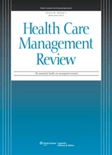
HEALTH CARE MANAGEMENT REVIEW
Scope & Guideline
Elevating health care management with impactful scholarship.
Introduction
Aims and Scopes
- Health Care Quality and Safety:
The journal emphasizes research on improving health care quality and patient safety through organizational practices, leadership, and management strategies. - Patient-Centered Care and Experience:
A core area of focus is understanding patient experiences and engagement in health care, including the role of communication, therapeutic relationships, and community involvement. - Organizational Behavior and Leadership:
Research on leadership styles, organizational culture, and employee well-being is prevalent, highlighting the importance of effective management in health care settings. - Health Care Policy and Systems:
The journal addresses the implications of health care policies, management practices, and systemic changes on service delivery and population health outcomes. - Innovative Practices and Technology in Health Care:
There is a consistent focus on the adoption of innovative practices and technological advancements in health care management to improve efficiency and effectiveness. - Workforce Dynamics and Human Resource Management:
The journal explores issues related to workforce management, including staff engagement, turnover, and the impact of organizational practices on health care professionals.
Trending and Emerging
- Resilience and Crisis Management:
There is a growing emphasis on resilience within health care organizations, particularly in response to crises such as the COVID-19 pandemic, highlighting the need for adaptive leadership and rapid organizational change. - Integrative Approaches to Patient Engagement:
Research is increasingly exploring integrative approaches to enhance patient engagement and involvement in care decisions, reflecting a shift towards more collaborative health care practices. - Mental Health and Well-Being of Health Care Workers:
The mental health and well-being of health care workers are gaining attention, particularly in light of the stresses associated with the pandemic, leading to research on supportive workplace practices. - Use of Technology and Data Analytics:
Emerging themes include the innovative use of technology and data analytics in health care management, focusing on improving patient outcomes and operational efficiencies. - Health Equity and Social Determinants of Health:
There is an increasing focus on health equity and the impact of social determinants of health, driving research that seeks to address disparities in health care access and outcomes.
Declining or Waning
- Traditional Models of Care Delivery:
Research centered around traditional, hierarchical care delivery models is becoming less frequent as more emphasis is placed on collaborative and integrated care approaches. - Basic Cost Management Strategies:
While financial performance remains important, the focus on basic cost management strategies is decreasing in favor of more comprehensive approaches that include value-based care and quality improvement. - Single-Disciplinary Perspectives:
There is a noted decline in studies that focus solely on single-disciplinary perspectives, as interdisciplinary approaches and collaborative management practices gain traction. - Static Organizational Structures:
Research on static organizational structures is less prevalent, reflecting a shift towards studying dynamic, flexible organizational frameworks that adapt to changing health care environments. - Generalized Patient Satisfaction Metrics:
The utilization of generalized patient satisfaction metrics without contextual analysis is declining in favor of more nuanced, qualitative assessments of patient experiences.
Similar Journals

Health Information Management Journal
Transforming Health Policy Through Scholarly DialogueHealth Information Management Journal, published by SAGE Publications Inc., is a premier academic resource dedicated to the intersection of health informatics, health information management, health policy, and leadership in health services. With an impressive track record since its inception in 2002, this journal steadily contributes to scholarly dialogue and innovation in the field, holding a commendable Q2 ranking in Health Informatics, Health Information Management, and Health Policy, and a distinguished Q1 ranking in Leadership and Management as of 2023. As a critical platform for researchers, professionals, and students, it fosters the dissemination of cutting-edge research and practical applications, bridging the gap between theory and practice. Though not an open-access journal, it provides a wealth of subscription-based resources that are invaluable for advancing knowledge and improving health systems globally. The journal’s commitment to high-quality, peer-reviewed content ensures that it remains a vital tool for anyone invested in the future of health information management.

Zeitschrift fur Evidenz Fortbildung und Qualitaet im Gesundheitswesen
Fostering excellence in health education and practice.Zeitschrift für Evidenz Fortbildung und Qualität im Gesundheitswesen, published by Elsevier GmbH, serves as a pivotal platform for the dissemination of research and innovations within the realms of health policy, medicine, and education. Established in 2008 and continuing its impactful trajectory through 2024, this journal boasts a recognition as a Q2 journal in Education and positions itself within the Q3 tier for both Health Policy and miscellaneous Medicine categories, reflecting its dual focus on scholarly rigor and practical application. Despite not being an Open Access journal, it remains a valued resource for academics and practitioners, evidenced by its rankings: #214 out of 398 in Medicine (miscellaneous) and #829 out of 1543 in Social Sciences (Education) according to Scopus metrics. The journal's commitment to enhancing education and quality in healthcare makes it an essential read for researchers, professionals, and students seeking to stay abreast of the latest evidence-based practices and policies that shape health outcomes worldwide.
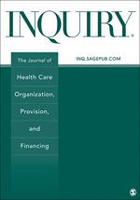
INQUIRY-THE JOURNAL OF HEALTH CARE ORGANIZATION PROVISION AND FINANCING
Unlocking the future of health care organization and financing.INQUIRY - THE JOURNAL OF HEALTH CARE ORGANIZATION PROVISION AND FINANCING, published by SAGE Publications Inc, is a distinguished academic journal that has been a vital resource in the field of health policy since its inception in 1972. With an impressive impact factor and categorization in Q2 of the health policy quartiles, this journal serves as a crucial platform for disseminating research that addresses the complexities of health care organizations, provision, and financing. Operating under an Open Access model since 2014, it ensures that knowledge is widely accessible, enabling researchers, professionals, and students to engage with cutting-edge findings and debates in health care delivery. With its ongoing commitment to advancing scholarship in health care systems, INQUIRY plays a pivotal role in shaping policy and practice, encouraging robust discussions that foster improvements in health care organization and financing structures.
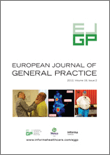
European Journal of General Practice
Empowering practitioners with essential knowledge and research.Welcome to the European Journal of General Practice, a leading open-access publication since 2016, published by Taylor & Francis Ltd in the United Kingdom. With ISSN 1381-4788 and E-ISSN 1751-1402, this esteemed journal has gained significant recognition in the field of general practice, achieving a Q1 ranking in both Family Practice and Medicine (Miscellaneous) categories in 2023. The journal's scope encompasses a wide array of topics relevant to contemporary general practice, including patient care, healthcare policy, and interdisciplinary collaboration, making it an essential resource for researchers, professionals, and students alike. It ranks impressively at #5 out of 56 in Scopus, placing it in the top 9th percentile of its category, reflecting its influence and commitment to advancing practice-based research. By fostering a collaborative platform for innovation and knowledge sharing, the European Journal of General Practice plays a crucial role in shaping the future of healthcare across Europe and beyond. Explore the latest research and insights that drive the field forward; this is your gateway to understanding the evolving landscape of general practice.

BMJ Leader
Navigating Innovation in Health LeadershipBMJ Leader, published by the esteemed BMJ PUBLISHING GROUP, is a vital resource for those engaged in the fields of Health Policy, Leadership and Management, and Strategy and Management. Since its inception in 2017 and spanning through 2024, this journal serves as a conduit for innovative research and practical insights that empower healthcare leaders and professionals to navigate complex challenges in modern healthcare systems. With an impressive standing in the Q2 and Q3 category quartiles and significant rankings within Scopus profiles for its relevant disciplines, BMJ Leader plays an essential role in shaping the discourse around effective leadership and strategy in health and management. Despite its open access status, the journal maintains a high impact factor, highlighting the relevance and quality of its content. As the landscape of healthcare continues to evolve, BMJ Leader remains committed to fostering collaboration and knowledge sharing among researchers, practitioners, and students alike, making it an indispensable addition to the academic community.
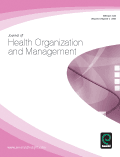
Journal of Health Organization and Management
Elevating the discourse on health organization and management.The Journal of Health Organization and Management, published by Emerald Group Publishing Ltd, serves as a pivotal resource for professionals, researchers, and students interested in the intersection of health policy and organizational effectiveness. With an ISSN of 1477-7266 and an E-ISSN of 1758-7247, this esteemed journal has been charting advancements in health management since 2003, showcasing articles that reflect rigorous research and the latest trends in the field. Hailing from the United Kingdom, the journal has established itself within the upper echelons of academic literature, currently enjoying a Q2 classification in notable categories, including Business, Management, and Accounting, Health Policy, and Organizational Behavior and Human Resource Management, as of 2023. With impressive rankings in Scopus, including a percentile rank in the 62nd for Business and Management, it is an essential platform for disseminating innovative ideas and evidence-based findings crucial for enhancing health care systems globally. While it operates under a conventional access model, the journal remains dedicated to fostering scholarly dialogue and advancing the understanding of health organization complexities.

Healthcare
Empowering healthcare solutions with cutting-edge insights.Healthcare is an esteemed academic journal published by MDPI, dedicated to advancing the field of health and medical sciences since its establishment in 2013. Operating from Switzerland, this Open Access journal aims to provide a platform for high-quality research that spans critical disciplines such as Health Informatics, Health Information Management, Health Policy, and Leadership and Management. With a 2023 Impact Factor reflected in its Q3 and Q2 rankings across various categories, Healthcare not only offers visibility and accessibility to innovative research but also fosters collaboration among researchers, professionals, and students dedicated to improving global health outcomes. The journal's commitment to disseminating knowledge and its diverse range of topics make it an essential resource for anyone involved or interested in the continuous evolution of health systems and practices, positioning it as a vital contributor to the future of health research.

JOURNAL OF CLINICAL NURSING
Transforming healthcare through scholarly nursing communication.The JOURNAL OF CLINICAL NURSING, published by WILEY, stands as a prestigious platform within the realm of nursing and medical research in the United Kingdom. With an ISSN of 0962-1067 and an E-ISSN of 1365-2702, this journal has been a cornerstone of scholarly communication since its inception in 1992. Spanning a comprehensive scope of clinical nursing practices and innovations, it consistently ranks in the first quartile (Q1) according to the latest metrics in both the disciplines of nursing and general medicine. The journal holds a commendable Scopus ranking of 8th out of 139 journals in General Nursing, placing it within the 94th percentile, which underscores its importance and influence in the academic community. Although it does not currently offer Open Access options, the JOURNAL OF CLINICAL NURSING provides an invaluable resource for researchers, healthcare professionals, and students, aiming to enhance clinical practices and address contemporary challenges within the field of nursing.

Journal of Healthcare Quality Research
Elevating standards in healthcare through collaboration.Journal of Healthcare Quality Research is an esteemed publication dedicated to advancing the field of health policy through rigorous research and comprehensive analysis. Published by ELSEVIER ESPANA SLU, this journal serves as a vital platform for researchers, professionals, and academics striving to address critical issues affecting healthcare quality across the globe. As a Q3 ranked journal in health policy for 2023, it holds a significant position within the Scopus rankings, showcasing its role in shaping healthcare discussions and policies. The E-ISSN: 2603-6479 reflects its commitment to wide accessibility, with an objective to provide insightful contributions that bridge gaps between theory and practice. With an impressive scope that spans from 2018 to 2024, the journal not only disseminates high-quality research but also fosters collaboration among policymakers and healthcare providers, driving innovations that enhance patient care and health systems worldwide.
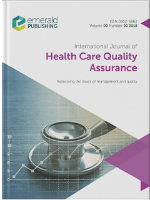
INTERNATIONAL JOURNAL OF HEALTH CARE QUALITY ASSURANCE
Elevating Standards in Health Care ManagementINTERNATIONAL JOURNAL OF HEALTH CARE QUALITY ASSURANCE is a leading academic journal published by Emerald Group Publishing Ltd, dedicated to advancing the fields of health care quality and health policy. Established in 1988, this esteemed journal addresses critical issues in health care management, offering insights into best practices and innovative strategies to enhance quality assurance in diverse health care settings. With an impact factor that places it in the Q3 tier across both health policy and business management categories, the journal serves as a valuable resource for researchers, practitioners, and students seeking to contribute to the conversation on health care quality improvement. Although currently not an Open Access journal, it remains accessible through various academic databases, facilitating a wide reach of its scholarly contributions. The journal's mission is to foster interdisciplinary dialogue and share evidence-based research that can inform policies and practices aimed at improving health care delivery globally.